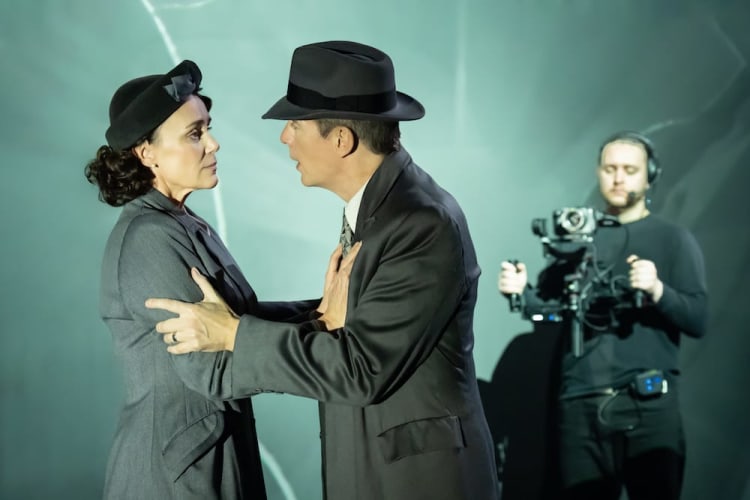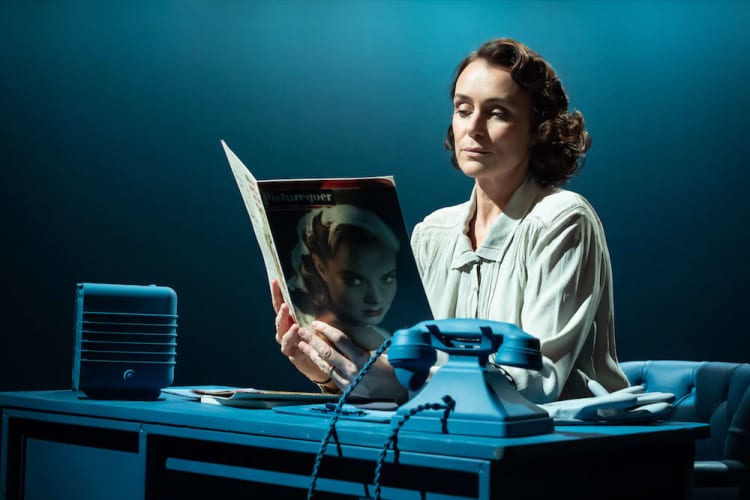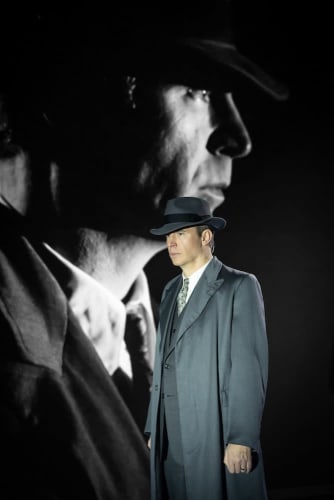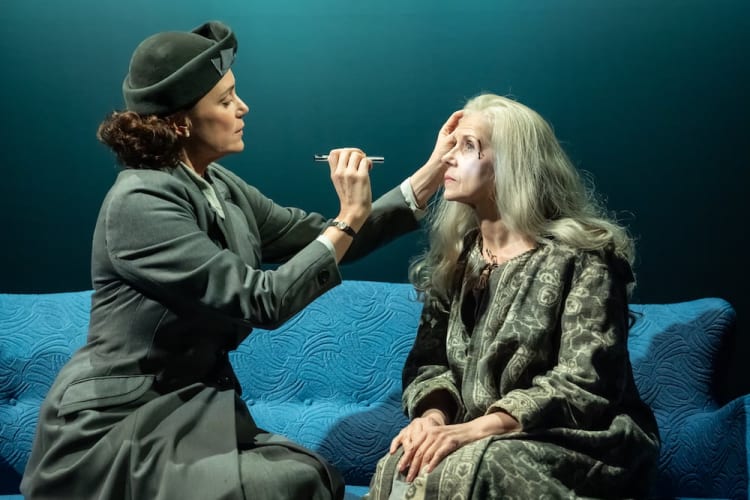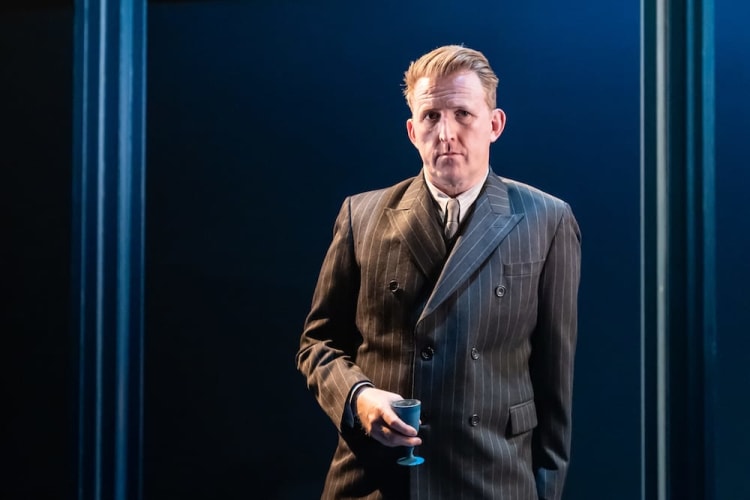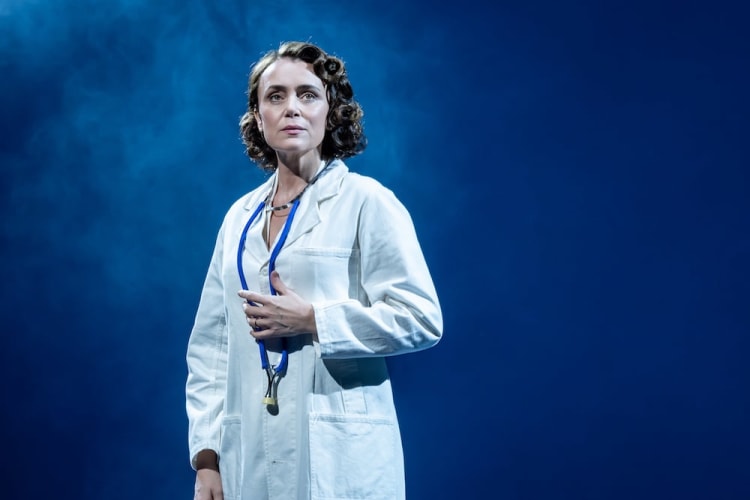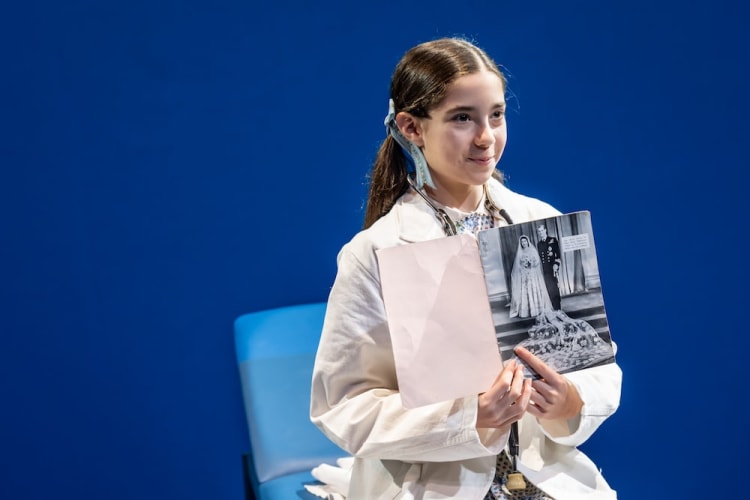David Lean’s 1945 film Brief Encounter (screenplay Noël Coward) and Pathé News blatantly establish the period of The Human Body’s doomed love story set in 1948 during Britain’s postwar austerity, the birth of the NHS, Attlee and Bevan, women’s slowly changing roles in society.
Private and political passions lock in Iris Elcock (Keeley Hawes), a forty-nine-year-old, middle-class Shropshire doctor and Labour councillor, a woman who desperately wants to be and do good. Married to an ex-Naval man physically and mentally affected by the war, with a young daughter (Audrey Kattan) obsessed by the upcoming royal wedding and the wedding dress, she is tolerance itself. “Keep feelings to yourself like normal people,” she is told.
One day, she meets dishy fifty-three-year-old George Blythe (Jack Davenport), a former local boy who has come to visit his mother. Turns out he’s an actor in Hollywood with a starlet wife (Pearl Mackie) there—a shallow world, "a moral vacuum” he implies, quoting Charlie Chaplin. They seem made for each other, a last grasp at happiness, but life is not so neat.
Her husband (Tom Goodman-Hill) is impotent, but that’s the grind of a woman’s life, mother, wife, housewife, juggling work and ambition. And now a chance at foolish love, and the temptation of fashion’s New Look. Pie in the sky, we know. Navigating their guilty subterfuge—with cameras following their every move—they must know real life will intrude. And it does. She asks her husband for a divorce—for a woman, a possible deathblow to her career—she won’t be able to stand for a Labour seat, which she wants ardently.
As she makes her decision, another blow comes down the telephone in their hotel room. George is called away by a calamity, and, being an honourable man, he does his duty. Duty is the essence of that buttoned-up period. Everyone is stoical, the poor and the not so poor. Much has been sacrificed for the war and now the Labour party wants to give them back some dignity. A parallel with today...
That’s the bare bones, but it’s the supporting actors playing multiple roles, Goodman-Hill, Mackie and Siobhán Redmond, who captivate me equally with their mercurial changes, body language, accents, playing up to eleven parts each. Their acting is so good—without the intrusive camera work, which focuses on the glamorous lovers.
Lucy Kirkwood has borrowed judiciously and has clearly done her research, but the script is baggy and lumbers at a slow pace. Maybe it’s the Katie Mitchell / Ivo von Hove ‘meta’ tropes, or the Brechtian camera crew and stage managers encroaching on dramatic stage reality. Do we watch the black and white film and its close-ups—and my goodness does the camera love both the leads—or try to engage with the ‘real’ actors before us a few feet away?
Just under three hours, is it a try-out for a mini series? There’s more than enough material for that. A member of the audience tells me he has come to see Hawes because he loved her in The Durrells television series. Perfectly cast here, she brings much genuine warmth to her character. “I was perfectly happy being miserable.”
Is it a political statement couched in a love story—slipping in the birth of the NHS just when it is dying on its feet in our present austere times? How it revolutionised medical care—free medical care. “The window for change—real change I mean—will close. It’s already closing. Very soon it will be shut, and we shan’t be able to get it open again.” How the past warns the present.
It’s timing coincides with Michael Sheen in Tim Price’s Nye directed by Rufus Norris at the National Theatre. But if you want to see a marvellous evocation of Aneurin "Nye" Bevan, there’s also the Trevor Griffiths scripted 1997 Food For Ravens film. The dying Bevan, the man pivotal in the creation of Britain's National Health Service, is played by Brian Cox. It’s still available on BBC iPlayer.
How convenient is the film Brief Encounter, how it lends itself to crossing genres... In 2008, Kneehigh’s Emma Rice also brilliantly and so realistically mixed immersive live action and film—her Brief Encounter was staged in the Haymarket Cinema, a venue that took the concept a step further.
Michael Longhurst and Ann Yee co-direct this his final production as Artistic Director. Yee's movement direction experience shows—the play is carefully choreographed. Fly Davis’s design is conceptual in having most of the props an NHS blue, and I notice most of the women wear the same shoes—all that was available in 1948, perhaps. And that banana skin, placed carefully by a stage manager for Iris to pick up and wonder at the marvel of a rarely seen banana, is maybe extraneous period detail, but true.
Joshua Pharo’s lighting, Nathan Amzi and Joe Ransom’s video design, Ben and Max Ringham’s sound design and score (do I hear Bing Crosby?) are cinematic, almost fooling us into believing we are in the cinema. Does Kirkwood see it as filmed theatre or theatre elevated to film, or hybrid cross-fertilisation?

